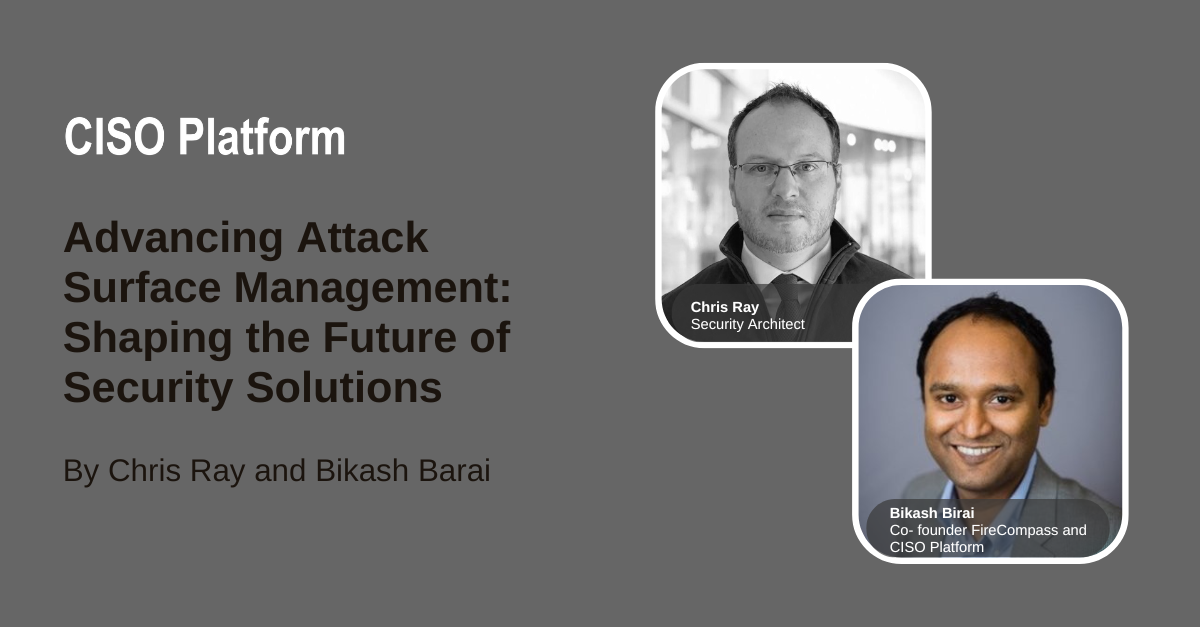In the dynamic realm of cybersecurity, Attack Surface Management (ASM) has emerged as a crucial linchpin in fortifying digital defenses. However, the future of ASM extends far beyond its current capabilities. As discussions around the future trajectory of ASM unfold, it becomes evident that its evolution will be characterized by a quest for continuous improvement and integration. In this blog, we delve into the nuances of ASM's future, exploring its potential to enhance security solutions and drive convergence in the cybersecurity landscape.
Highlights:
Moving Beyond Passive Solutions: While ASM has traditionally focused on passive vulnerability identification, there is a growing recognition of the limitations of such approaches. The conversation underscores the dangers of complacency and emphasizes the need for ASM solutions that go beyond passive scanning. As organizations evaluate potential solutions, considerations such as false positive rates and prioritization become paramount in ensuring effective risk management.
Enabling Comprehensive Security Solutions: The future of ASM lies in its ability to serve as the bedrock for comprehensive security solutions. This entails not only identifying vulnerabilities but also integrating proactive measures for threat mitigation. As highlighted in the discussion, ASM has the potential to enable better security solutions by driving convergence in the cybersecurity space. Whether through mergers and acquisitions or the development of broader capabilities by industry leaders, ASM is poised to play a pivotal role in shaping the future of cybersecurity.
Embracing Continuous Improvement: As ASM evolves, the emphasis on continuous improvement becomes increasingly pronounced. The vision for the future of ASM involves a commitment to innovation and adaptation to emerging threats. By leveraging advancements in technology and best practices, ASM solutions can stay ahead of evolving threats and provide organizations with the tools they need to safeguard their digital assets effectively.
The future of Attack Surface Management is characterized by a relentless pursuit of excellence and innovation. As organizations confront an ever-expanding threat landscape, ASM serves as a beacon of resilience and adaptability. By moving beyond passive approaches and embracing proactive risk management strategies, ASM has the potential to revolutionize the cybersecurity paradigm. As we embark on this journey towards a more secure future, the role of ASM as the foundation for better security solutions cannot be overstated. Through collaboration, innovation, and a commitment to continuous improvement, ASM will continue to shape the future of cybersecurity, ensuring that organizations remain resilient in the face of evolving threats.
Speakers:
Chris Ray, a seasoned professional in the cybersecurity field, brings a wealth of experience from small teams to large financial institutions, as well as industries such as healthcare, financials, and tech. He has acquired an extensive amount of experience advising and consulting with security vendors, helping them find product-market fit as well as deliver cyber security services.
Bikash Barai is credited for several innovations in the domain of Network Security and Anti-Spam Technologies and has multiple patents in USPTO. Fortune recognized Bikash among India’s Top 40 Business Leaders under the age of 40 (Fortune 40-under-40).Bikash is also an active speaker and has spoken at various forums like TiE, RSA Conference USA, TEDx etc.
Earlier he founded iViZ an IDG Ventures-backed company that was later acquired by Cigital and now Synopsys. iViZ was the first company in the world to take Ethical Hacking (or Penetration Testing) to
the cloud.


Comments